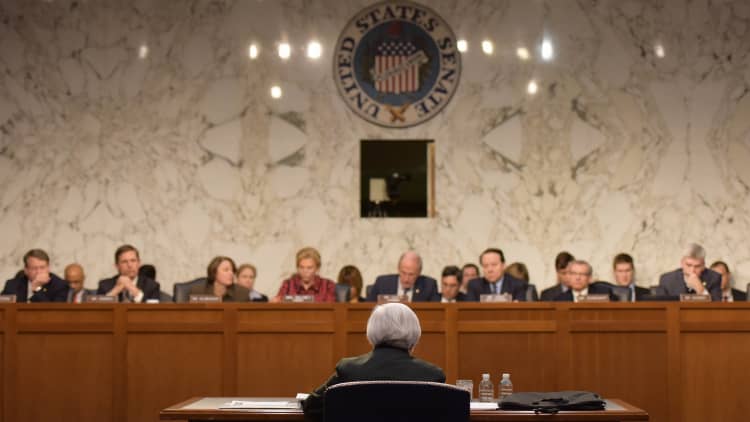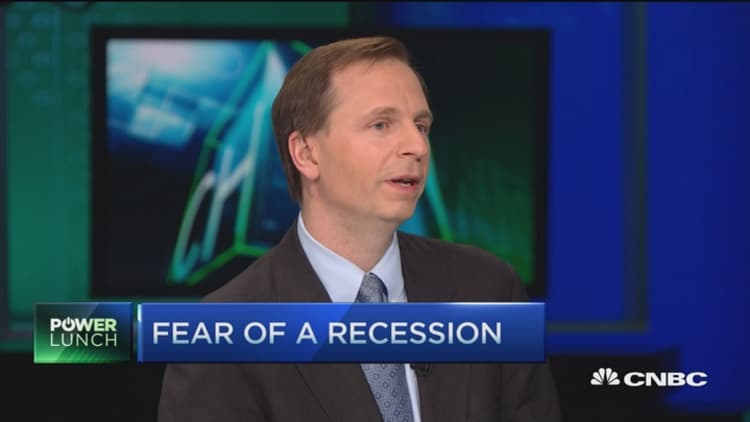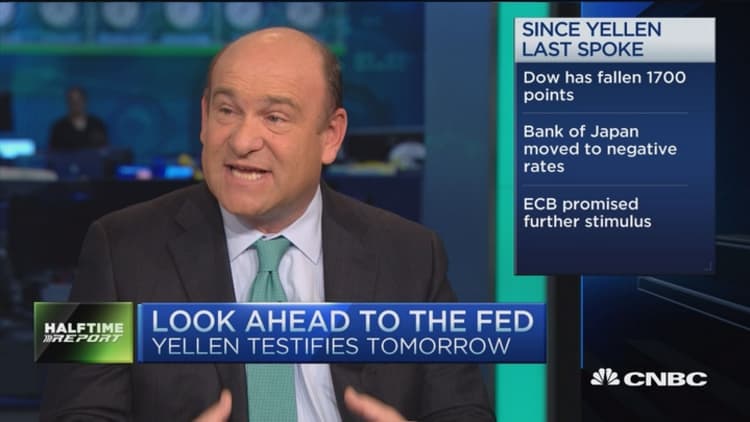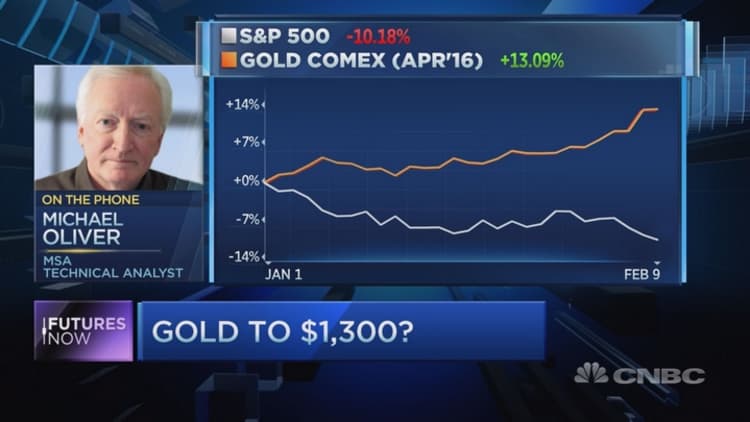


Fed Chair Janet Yellen is expected to attempt to balance the central bank's stated goal of raising interest rates against the risks of a weaker global economy.
Yellen is scheduled to testify on the economy before congressional committees Wednesday and Thursday. She is likely to be asked about everything from rate hikes to banking reform. But her bigger audience will be world financial markets, rattled by the fact that the Fed's forecast continues to show rate hikes as markets gyrate over fears of a weakening world outlook and divergent central bank maneuvering.
The Fed chair is in a tight spot, with markets wary of Fed policy to normalize rates, while other major central banks have turned to increased easing and even negative interest rates. She begins speaking before the House Committee on Financial Services at 10 a.m. ET Wednesday. Her comments will be released at 8:30 a.m. ET.
Stocks were sharply higher ahead of her testimony Wednesday, and the dollar rose. Treasury yields were also higher, with the 2-year yield at 0.72 percent.
"I think it's going to be hard for her not to move the markets. The question is the direction. That's really less clear. If the equity market really is looking for her to give a message that says they're not hiking anytime soon, the market could be disappointed," said Michael Hanson, senior economist at Bank of America Merrill Lynch.
But comments on whether the Fed will still be considering a rate hike at its March meeting is just what markets want to hear.
"What we don't want is for her to just say, 'We are data dependent.' We know that. What we want her to say is market turmoil is a significant issue for the Fed, and they will respond to market turmoil in some way. Until we see that, I think markets will remain in a tizzy," said Krishna Memani, chief investment officer at OppenheimerFunds.
Memani said the market volatility is the result of the fact that the Fed set a course toward higher rates and started talking about it as far back as 2014. "That is not going to stop until they tip their hand and tell us they are off that bandwagon for a bit," he said. "In all likelihood, she does not do that and things will continue as they are."

But Memani said in the short term, Yellen could sound dovish enough to bounce risk markets for a day or two. In recent comments, New York Fed President William Dudley said the U.S. central bank would take note of the worsening financial conditions when it considers rate hikes.
"She's got a difficult job to really put a voice on what we assume is a more dovish stance for 2016," said Chris Rupkey, chief financial economist at MUFG Union Bank. "What she has to do without taking March off the table is to take March off the table. She has to lean toward financial conditions, no signs of inflation and what has happened in the real world since the last time they made a move."
The Fed's last economic forecast was released when it raised interest rates for the first time in nine years at its December meeting. The next Fed forecast for the economy and interest rates will be released when it meets March 16.
"I guess she has to tread lightly here," said Rupkey. "The protocol is for the chairman to stick with the consensus forged at the most recent meeting."
Markets have been gripped by fear in the past several weeks as Japan's central bank unleashed negative interest rates and the European Central Bank promised to revisit more easing when it meets in March. China's weaker economy has kept markets on edge, amid worries it will devalue its currency.
At the same time, the economic data in the U.S. have been softer than expected, with last week's January's employment report an exception.
"The Fed recognizes there's a lot of volatility in the market, and a lot of times that doesn't have economic implications so they want to wait and see how the volatility may or may not spill over into economic activity. They're working with a different clock than the markets have. The Fed is working with a sundial and the markets have a stopwatch," said Hanson.
But that may not satisfy traders, who are looking for more detailed policy guidance from the Fed. "What the market is proving over and over again is it is not about oil. It is not energy credit. It is not bank stocks. It really is about central banks' policy, and the only central bank policy that matters in the world is the Fed," said Memani.
"They believe the central banks have no control over it, but the largest central bank in the world doesn't want to engage with the markets. In the markets' framework, the markets are going one way and the Fed is going the other, and they don't like it," Memani said.
In the weeks that followed the Bank of Japan and ECB's latest easing comments, both the yen and euro have strengthened against the dollar as financial markets reeled. U.S. Treasury yields have fallen to lows last seen before the Fed began raising rates. If the dollar remains weaker, it may defy the efforts of foreign central banks but help the U.S. economy.
Yellen is expected to touch on the economic weakness and refer to financial conditions. Rupkey said the question is whether the Fed has enough evidence on the impact on the economy to hold off on rate hikes. "If that's the message we get, the markets will take it as a positive. The risk is if she downgrades it more than what the market is pricing in," he said.
Yellen is likely to be asked about the negative rates adopted in Europe and Japan and now attached to trillions of dollars of debt. Rupkey said Yellen may say the Fed has studied it, but it's an option and it's not in the plans for now.
"The game plan is still for gradual (hiking) moves," he said. "It might be better for her to keep with the game plan and tell people the pace of rate hikes is still expected to be gradual. I think the 800-pound gorilla in the room is that the market really expects a recession. It's not just dark clouds."
Rupkey said he expects Yellen to acknowledge that conditions have changed since the Fed hiked rates, and that they will remain data dependent.
"She's not going to come out and break new ground and say the Fed sees downside risks. The market may take her testimony and questions and answers a little more optimistically than what they're feeling right now. It's not a high bar either. People think the ship is sinking on our economic ship of state," he said.
Besides Yellen's testimony, there is a 10-year Treasury auction at 1 p.m. ET. Oil inventory data are released at 10:30 a.m. Earnings are expected from Time Warner, Humana, Nissan, Owens Corning, Sealed Air and Carlyle Group before the bell. Cisco Systems, Tesla Motors, Twitter, Whole Foods and Pioneer Natural Resources report after the closing bell.


